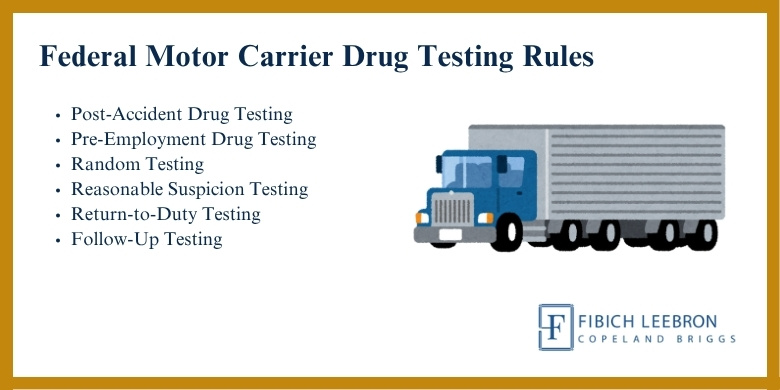
Drug use is a factor in many commercial truck accidents, both in Texas and the country at large. The Federal Motor Carrier Safety Administration (FMCSA) reports that in one recent year, about 5.5 percent of truck drivers involved in all fatal commercial vehicle crashes nationwide tested positive for at least one illegal drug in their system. In an effort to reduce the number of these preventable accidents, the FMCSA requires truck drivers to undergo drug testing in a number of circumstances.
When Are Truck Drivers Tested?
In general, federal and state regulations require truck drivers to take drug tests in the following situations:
- After any fatal crash
- After a crash with injuries or property damage, if the police cite the truck driver for causing the crash
- Before going to work for a new employer
- When their employer orders them to take a random test
- When a trained supervisor has a reasonable suspicion that the driver is using drugs
- After any violation of drug testing rules, before returning to work (the test must occur under direct observation)
CDL Drug Test Requirements in Texas
Texas law does not require people to pass a drug test to obtain a Commercial Driver’s License (CDL). However, state and federal regulations require CDL holders to pass a drug test before they can work for a new employer. Furthermore, Texas law requires trucking companies to report positive drug and alcohol test results to the Department of Public Safety, even though the federal FMCSA Clearinghouse also collects this information. Otherwise, Texas regulations regarding drug tests for truck drivers largely mirror those of the FMCSA.
Federal Motor Carrier Drug Testing Rules

The FMCSA sets strict rules for when commercial truck drivers must take drug tests. These rules apply to drivers with a Commercial Driver’s License (CDL) operating a commercial motor vehicle over 26,000 lbs., carrying hazardous materials, or transporting 16 or more passengers. Required testing situations for CDL drivers include:
Post-Accident Drug Testing
- Post-accident drug testing is mandatory after any fatal accident, regardless of fault.
- Testing is also required if the driver receives a citation for a moving violation related to an accident that causes injuries or disables a vehicle.
- Truck drivers must take the drug test within 32 hours of the crash.
Pre-Employment Drug Testing
- Truck drivers must test negative for drugs before going to work for a new employer.
Random Testing
- Truck drivers may be subject to random CDL drug testing by their employers. They must report immediately once notified of a random test, even if they’re off-duty.
Reasonable Suspicion Testing
- A trained supervisor can order a truck driver to take a drug test if they observe signs of the driver using drug use.
Return-to-Duty Testing
- Testing is required after a violation and before returning to safety-sensitive work. These tests must occur under direct observation.
Follow-Up Testing
- After returning to duty, drivers may need to undergo at least six directly observed tests within 12 months, with continued follow-ups for up to five years.
Can a UPS Employee Refuse a Drug Test?
Generally, UPS employees cannot refuse drug tests if the test is required by company policy or state or federal regulations. Refusing a test is often grounds for disciplinary action, up to and including termination of employment.
Contact Our Houston Truck Accident Attorneys to Learn More
With decades of combined legal experience and board-certified personal injury specialists on our team, Fibich, Leebron, Copeland & Briggs has the resources to help you hold an intoxicated truck driver accountable for your injuries. Call now or complete our contact form for a free consultation with a truck accident lawyer in Houston.
